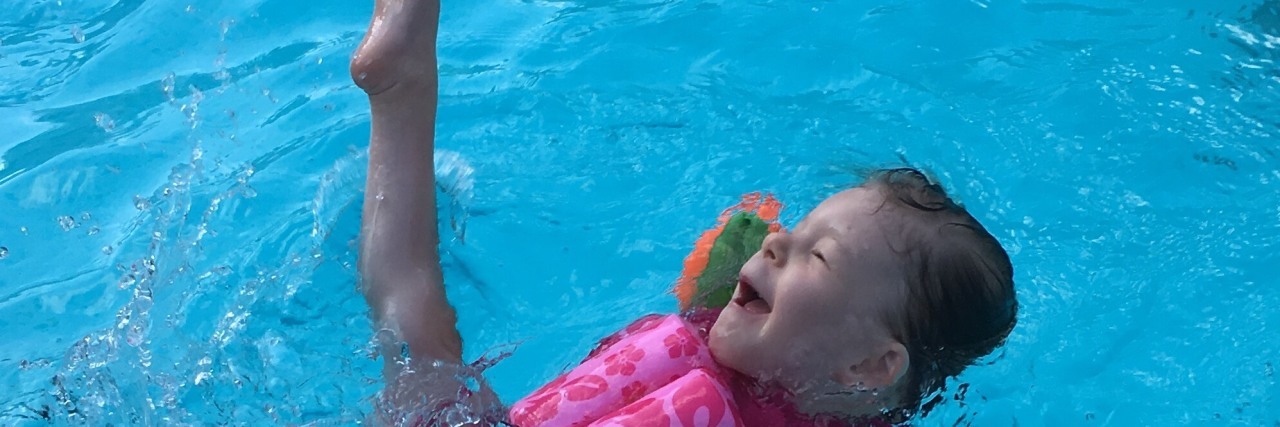Please allow me to introduce myself:
My name is Jenni Williams and I’m 43 years old. I’m short sighted, -4.75 in the left eye and -5.00 in the right. I had my appendix out in December 1994. I’m on the contraceptive pill. I get thrush once or twice a year. My last pap-smear test was in January 2018, results normal.
Too much information.
I know this is a slightly embarrassing way to make your acquaintance, but my daughter is introduced by her personal medical history in hospital clinic letters and other pieces of official paperwork, so it seems only fair that I should experience what it feels like. And it feels very uncomfortable. I didn’t like writing that introductory paragraph and I really don’t like the fact that you now know those things about me. Firstly, it’s personal; secondly, it’s irrelevant to who I am as a person. Oddly enough, I don’t feel defined by my lack of an appendix.
Of course I know my daughter’s clinic letters have to list her medical conditions and this is not in any way a criticism of her consultants. They are skilled and dedicated doctors and warm and caring people who are always interested in how Eve is doing overall. I am grateful every single day that we live in a country where this treatment is free at the point of need.
Nonetheless, it bothers me because I am reminded this is how society often views Eve and children like her — as a list of medical conditions. Someone to feel pity for or even someone who, in some quarters, is considered a burden or not as worthy of life as “normal” people. Too much focus on someone’s medical conditions can obscure what really matters: that we are all unique individuals, regardless of our medical history.
Don’t get me wrong — my husband and I don’t ignore Eve’s complex medical needs. We’re fastidious about her medication and keeping her safe. One of her conditions is never far from our minds and she is never truly alone — she sleeps in our room and for the few hours that she’s in bed before we are, we have an ear and an eye on the video monitor.
Yet, all this aside, I want Eve to be known first and foremost for her personality — her approach to life, her likes and dislikes, strengths and weaknesses, character traits and quirks. I don’t want her to be seen as a list of medical conditions.
Thankfully, we’re not the only ones who see her this way. For example, at Eve’s amazing school, the children are celebrated as individuals. Their diagnoses are used solely to keep them safe and tailor their education.
In addition, Eve has recently come under the care of a new consultant geneticist — a specialist in cancer genetics — who will oversee one of Eve’s conditions that now needs to be regularly monitored. In a clinic letter primarily discussing the impact of the loss of a single gene, this consultant also referred to Eve’s role as an ambassador for an annual disability sports event: the Superhero Tri. How wonderful that a doctor who focuses on the human body at a sub-cellular level can also see the big picture.
Ultimately, whenever I read her list of conditions, I want to shout to the world that’s not Eve. So in the interests of redressing the balance, here’s her alternative diagnoses according to the specialist who knows her best: me.
• Acute cuteness syndrome.
• Systemic happiness.
• Chronic determination.
• Congenitally stubborn.
• Developmentally advanced “bullshit radar.”
• Communicable sense of humor.
• Infectious cheeky grin.
• Clinical obsession with “Fraggle Rock” and Disney movies.
• Degenerative addiction to swimming — most severe episode lasted over three hours and resulted in a prolonged loss of consciousness (fell asleep in the pool).
• Endemic Ambassador for the Superhero Tri Series.
• Malignant (for her parents) love of any plastic toy that lights up and plays annoying music.
• Pathological dependency on getting in bed with Mummy in the middle of the night.
• Incurable love of Mummy’s spaghetti Bolognese.
• Febrile excitement at going to school.
• Relapse of febrile excitement when seeing Mummy again at the end of school.
• Epidemic levels of affection, often co-morbid with wanting to watch cartoons on YouTube with Daddy.
• Unresponsive when told not to open the kitchen cupboards.
In summary, a beautiful little soul inside and out, and the best company in the world.
A version of this post first appeared on Rollin’ With Mama.

